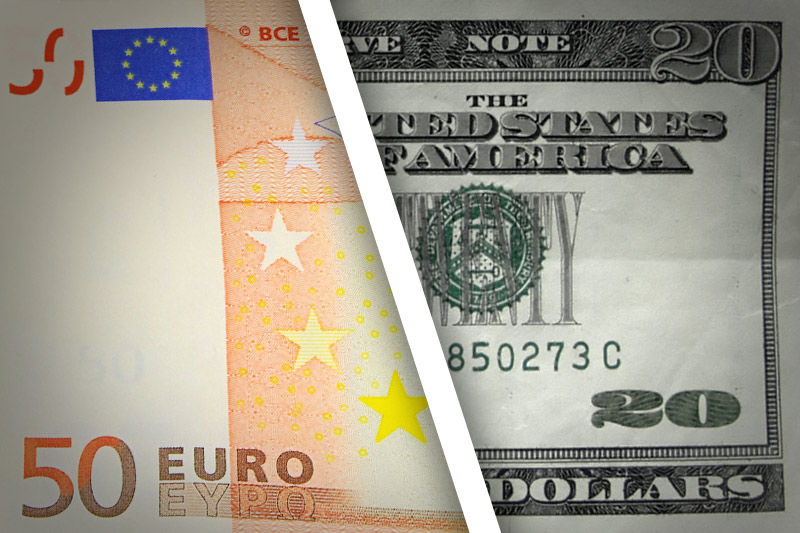Who is Kevin Hassett? Wolfe looks at the Trump ally tipped to become Fed Chair.
Investing.com - The euro held steady against the dollar on Thursday as investors took in conflicting U.S. housing data and ongoing European uncertainty, buying and selling both currencies while digesting the Bank of Japan's decision to expand its stimulus programs and weaken the yen.
In Asian trading on Thursday, EUR/USD was trading up 0.02% at 1.3051, up from a session low of 1.2994, and off from a high of 1.3085.
The pair was likely to find short-term support at 1.2979, the low of September 14 and resistance at 1.3085, the daily high.
Bullish housing news broke in the U.S. earlier.
The National Association of Realtors reported that existing home sales in the U.S. rose by 7.8% to a seasonally adjusted 4.82 million units in August, surpassing market expectations for a 2% increase to 4.55 million units.
Groundbreaking on new homes, however, rose less than expected in August, while building permits issued declined.
In a report, the U.S. Census Bureau that U.S. housing starts rose by 2.3% in August to a seasonally adjusted 750,000, below expectations for an increase to 765,000.
The report also showed that the number of building permits issued in August fell 1% to a seasonally adjusted 803,000, compared to expectations for a decline of 1.8% to 796,000.
While investors agreed the data showed continued improvement in U.S. housing, most agreed it is still way too early to claim victory for the sector.
Credit still remains tight and millions of homes coming off foreclosure are due to hit the market in the near future, which will hamper recovery.
Meanwhile in Europe, reports surfaced that German lawmakers are seeking to water down proposals for a European banking union and supervision of eurozone banks by the European Central Bank.
Dow Jones Newswires reported earlier that the German government not only wants a strict separation of bank supervision and monetary policy in Europe, but also favors a separate bank-supervision body that would give large countries more votes.
Meanwhile, investors continue to battle uncertainty surrounding Spain and its plans to request assistance from the European Central Bank's new bond-buying program.
Both currencies, however, saw support on the Bank of Japan's decision to increase the size of its monthly bond purchases by JPY10 trillion to a total of JPY80 trillion.
The JPY10 trillion increase in the asset-purchase program will be split equally towards additional purchases of treasury discount bills and Japanese government bonds, the central bank said in a statement.
The Bank of Japan also left its policy interest-rate target unchanged in the current range of zero to 0.1%
The euro, meanwhile, was down slightly against the pound and up against the yen, with EUR/GBP trading down 0.01% at 0.8043, and EUR/JPY trading up 0.05% at 102.32.
In Asian trading on Thursday, EUR/USD was trading up 0.02% at 1.3051, up from a session low of 1.2994, and off from a high of 1.3085.
The pair was likely to find short-term support at 1.2979, the low of September 14 and resistance at 1.3085, the daily high.
Bullish housing news broke in the U.S. earlier.
The National Association of Realtors reported that existing home sales in the U.S. rose by 7.8% to a seasonally adjusted 4.82 million units in August, surpassing market expectations for a 2% increase to 4.55 million units.
Groundbreaking on new homes, however, rose less than expected in August, while building permits issued declined.
In a report, the U.S. Census Bureau that U.S. housing starts rose by 2.3% in August to a seasonally adjusted 750,000, below expectations for an increase to 765,000.
The report also showed that the number of building permits issued in August fell 1% to a seasonally adjusted 803,000, compared to expectations for a decline of 1.8% to 796,000.
While investors agreed the data showed continued improvement in U.S. housing, most agreed it is still way too early to claim victory for the sector.
Credit still remains tight and millions of homes coming off foreclosure are due to hit the market in the near future, which will hamper recovery.
Meanwhile in Europe, reports surfaced that German lawmakers are seeking to water down proposals for a European banking union and supervision of eurozone banks by the European Central Bank.
Dow Jones Newswires reported earlier that the German government not only wants a strict separation of bank supervision and monetary policy in Europe, but also favors a separate bank-supervision body that would give large countries more votes.
Meanwhile, investors continue to battle uncertainty surrounding Spain and its plans to request assistance from the European Central Bank's new bond-buying program.
Both currencies, however, saw support on the Bank of Japan's decision to increase the size of its monthly bond purchases by JPY10 trillion to a total of JPY80 trillion.
The JPY10 trillion increase in the asset-purchase program will be split equally towards additional purchases of treasury discount bills and Japanese government bonds, the central bank said in a statement.
The Bank of Japan also left its policy interest-rate target unchanged in the current range of zero to 0.1%
The euro, meanwhile, was down slightly against the pound and up against the yen, with EUR/GBP trading down 0.01% at 0.8043, and EUR/JPY trading up 0.05% at 102.32.
